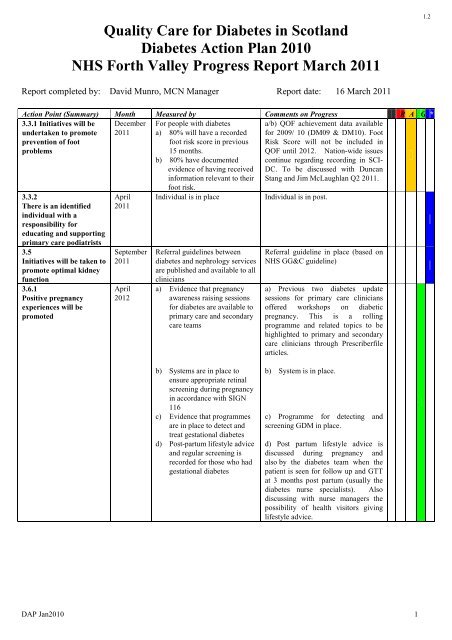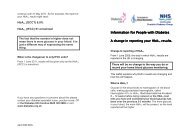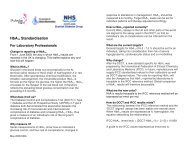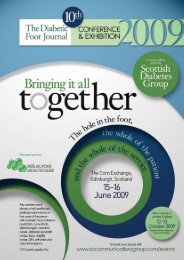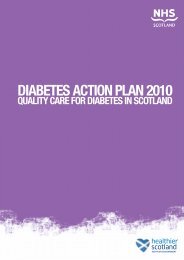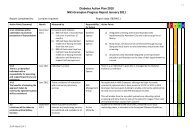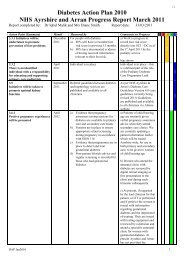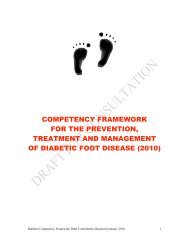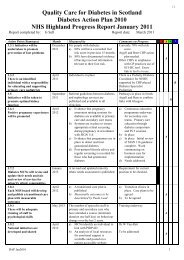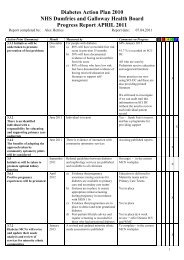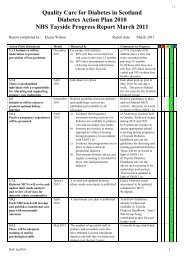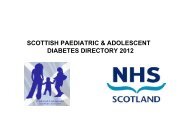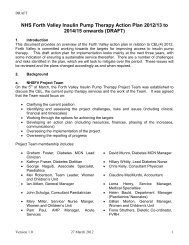Diabetes Action Plan 2010 NHS Forth Valley Progress Report March 2011
View Document - Diabetes in Scotland
View Document - Diabetes in Scotland
- No tags were found...
You also want an ePaper? Increase the reach of your titles
YUMPU automatically turns print PDFs into web optimized ePapers that Google loves.
Quality Care for <strong>Diabetes</strong> in Scotland<br />
<strong>Diabetes</strong> <strong>Action</strong> <strong>Plan</strong> <strong>2010</strong><br />
<strong>NHS</strong> <strong>Forth</strong> <strong>Valley</strong> <strong>Progress</strong> <strong>Report</strong> <strong>March</strong> <strong>2011</strong><br />
1.2<br />
<strong>Report</strong> completed by: David Munro, MCN Manager <strong>Report</strong> date: 16 <strong>March</strong> <strong>2011</strong><br />
<strong>Action</strong> Point (Summary) Month Measured by Comments on <strong>Progress</strong> R A G *<br />
3.3.1 Initiatives will be<br />
undertaken to promote<br />
prevention of foot<br />
December<br />
<strong>2011</strong><br />
a/b) QOF achievement data available<br />
for 2009/ 10 (DM09 & DM10). Foot<br />
Risk Score will not be included in<br />
problems<br />
QOF until 2012. Nation-wide issues<br />
3.3.2<br />
There is an identified<br />
individual with a<br />
responsibility for<br />
educating and supporting<br />
primary care podiatrists<br />
3.5<br />
Initiatives will be taken to<br />
promote optimal kidney<br />
function<br />
3.6.1<br />
Positive pregnancy<br />
experiences will be<br />
promoted<br />
April<br />
<strong>2011</strong><br />
September<br />
<strong>2011</strong><br />
April<br />
2012<br />
For people with diabetes<br />
a) 80% will have a recorded<br />
foot risk score in previous<br />
15 months.<br />
b) 80% have documented<br />
evidence of having received<br />
information relevant to their<br />
foot risk.<br />
Individual is in place<br />
Referral guidelines between<br />
diabetes and nephrology services<br />
are published and available to all<br />
clinicians<br />
a) Evidence that pregnancy<br />
awareness raising sessions<br />
for diabetes are available to<br />
primary care and secondary<br />
care teams<br />
continue regarding recording in SCI-<br />
DC. To be discussed with Duncan<br />
Stang and Jim McLaughlan Q2 <strong>2011</strong>.<br />
Individual is in post.<br />
Referral guideline in place (based on<br />
<strong>NHS</strong> GG&C guideline)<br />
a) Previous two diabetes update<br />
sessions for primary care clinicians<br />
offered workshops on diabetic<br />
pregnancy. This is a rolling<br />
programme and related topics to be<br />
highlighted to primary and secondary<br />
care clinicians through Prescriberfile<br />
articles.<br />
b) Systems are in place to<br />
ensure appropriate retinal<br />
screening during pregnancy<br />
in accordance with SIGN<br />
116<br />
c) Evidence that programmes<br />
are in place to detect and<br />
treat gestational diabetes<br />
d) Post-partum lifestyle advice<br />
and regular screening is<br />
recorded for those who had<br />
gestational diabetes<br />
b) System is in place.<br />
c) Programme for detecting and<br />
screening GDM in place.<br />
d) Post partum lifestyle advice is<br />
discussed during pregnancy and<br />
also by the diabetes team when the<br />
patient is seen for follow up and GTT<br />
at 3 months post partum (usually the<br />
diabetes nurse specialists). Also<br />
discussing with nurse managers the<br />
possibility of health visitors giving<br />
lifestyle advice.<br />
DAP Jan<strong>2010</strong> 1
1.2<br />
<strong>Action</strong> Point (Summary) Month Measured by Comments on <strong>Progress</strong> R A G *<br />
3.7.2<br />
<strong>Diabetes</strong> MCNs will revise<br />
and update their needs<br />
analysis and review of<br />
services for minority ethnic<br />
communities<br />
January<br />
2013<br />
A revised and updated minority<br />
ethnic needs assessment is<br />
published<br />
A revised and updated minority<br />
ethnic needs assessment is on target<br />
to be completed by Jan. 2013.<br />
3.8.2<br />
Each <strong>NHS</strong> board will<br />
develop and publish a<br />
transitional care plan with<br />
measurable outcomes<br />
3.9.1<br />
There will be adequate<br />
training of staff in<br />
psychological skills<br />
3.9.2<br />
National initiatives are<br />
developed and shared<br />
3.10.3<br />
Education will be<br />
improved at local level<br />
April<br />
2012<br />
May 2013<br />
April<br />
2012<br />
April<br />
<strong>2011</strong><br />
December<br />
<strong>2011</strong><br />
June 2013<br />
April<br />
2012<br />
A transitional care plan is<br />
published.<br />
The number of specialist staff in<br />
primary and secondary care who<br />
have attended a course<br />
(minimum duration one half<br />
day) on behaviour change over<br />
the last 2 years.<br />
a) MCNs identify an<br />
individual to link with<br />
PIDPAD<br />
b) An analysis of local<br />
resources for emotional<br />
support is available and<br />
posted on a patientaccessible<br />
website<br />
a) There is an identified<br />
individual who will oversee<br />
the delivery of local patient<br />
education programmes<br />
b) There is evidence that a<br />
range of education<br />
solutions, including<br />
structured education<br />
programmes is available<br />
c) A user assessment in<br />
relation to patient education<br />
has been undertaken as is<br />
available<br />
d) The proportion of patients<br />
attending structured<br />
education programmes is<br />
recorded<br />
e) Support measures for people<br />
with diabetes are publicised<br />
so they are readily available.<br />
Transition clinic in place for last 6<br />
years. Standard process in place.<br />
Will start recording this in April<br />
<strong>2011</strong> for secondary care specialist<br />
staff. (KF & HW). Primary care staff<br />
have access to training but this is not<br />
counted across individual practices.<br />
a) Link person to be agreed. The first<br />
meeting of the PIDPAD group is to<br />
be in May <strong>2011</strong> (KF/ AP in<br />
attendance).<br />
b) QOF depression screening<br />
questions backed up by HADS<br />
questionnaire. Previous mild to<br />
moderate mental health Local<br />
Enhanced Service to emphasise the<br />
use of HADS screening tool. Use of<br />
Moodjuice website and Beating the<br />
Blues interactive computer program.<br />
Considerable work carried out<br />
through LTC Collaborative with<br />
development of the Self care Toolkit<br />
and “My Support <strong>Plan</strong>”. In FV, print<br />
run on order for self care toolkit and<br />
support plan for distribution to all<br />
primary care practices. LTC<br />
eHealth national bid received to<br />
develop SID site to improve patient<br />
usability and storage of self<br />
management materials.<br />
a) The chair of the <strong>Diabetes</strong> MCN<br />
Education Subgroup oversees the<br />
delivery of local patient education<br />
programmes.<br />
b) A range of solutions available for<br />
T2DM (varies across GP Practices).<br />
T1DM education is via secondary<br />
care. (KF).<br />
c) Daily feedback questionnaires<br />
completed for NewDEAL.<br />
NewDEAL patient stores also<br />
available via NES<br />
d) Patients attending NewDEAL is<br />
recorded.<br />
e) Service Information Directory<br />
website/ system developed, now with<br />
improved patient usability and<br />
storage of self management<br />
materials.<br />
DAP Jan<strong>2010</strong> 2
1.2<br />
<strong>Action</strong> Point (Summary) Month Measured by Comments on <strong>Progress</strong> R A G *<br />
3.11.2<br />
The local insulin strategy is<br />
reviewed<br />
June <strong>2011</strong> The local insulin strategy is<br />
published<br />
Insulin strategy published.<br />
3.11.1.1<br />
People with diabetes who<br />
could benefit from<br />
intensive insulin therapy<br />
should have access to<br />
structured education<br />
programmes<br />
3.11.1.2<br />
Insulin pump therapy is<br />
available for those patients<br />
who would benefit from it<br />
3.12.3.1<br />
The incidence of<br />
hypoglycaemia that results<br />
in emergency admissions<br />
will be reduced<br />
3.12.3.2<br />
The incidence and care of<br />
DKA will be improved<br />
3.13.1.1<br />
There will be initiatives to<br />
improve care for inpatients<br />
3.13.1.2<br />
Mechanisms to record the<br />
number of inpatient wards<br />
with specific hypo<br />
guidelines are developed<br />
3.13.2.1<br />
Local provision of<br />
education to the staff<br />
working in institutional<br />
settings is improved<br />
4.1.1<br />
Implementation of<br />
research-based high<br />
quality clinical practice<br />
will be supported<br />
June 2012<br />
June <strong>2011</strong><br />
December<br />
2012<br />
December<br />
<strong>2011</strong><br />
June 2012<br />
June 2012<br />
December<br />
<strong>2011</strong><br />
December<br />
<strong>2011</strong><br />
The number of people with<br />
diabetes who receive instruction<br />
in CHO counting is recorded and<br />
reported<br />
The number of people on insulin<br />
pumps is reported<br />
A care pathway of people who<br />
experience severe<br />
hypoglycaemia will take account<br />
of national work and implement<br />
when appropriate<br />
A care pathway of people for the<br />
presentation and management of<br />
DKA will take account of<br />
national work and implement as<br />
appropriate<br />
a) A foot protection programme<br />
for patients with diabetes on<br />
general wards will be<br />
published<br />
b) Initiatives from the inpatient<br />
group as agreed by the SDG<br />
will be implemented<br />
The number and proportion of<br />
wards is reported<br />
There is evidence that staff from<br />
institutional settings, including<br />
care homes, have access to<br />
educational events<br />
a) There is evidence that local<br />
diabetes guidelines are<br />
updated in line with SIGN<br />
116<br />
b) The number of people<br />
recruited to the SDRN<br />
register is reported.<br />
Information on CHO is added to SCI-<br />
DC as free text and is not auditable.<br />
Will discuss changes in SCI-DC to<br />
automate any audit with Mary Scott.<br />
8 children on CSII pump therapy<br />
32 adults on CSII pump therapy and<br />
7 people who are being considered or<br />
have expressed an interest in being<br />
considered.<br />
Patients seen in A&E. Weekly list of<br />
patients printed for follow-up by<br />
DSN by phone. Will consider<br />
national findings when available.<br />
Will also benchmark local<br />
performance with national situation.<br />
DKA pathway published. Will<br />
consider national findings when<br />
available.<br />
a) To be discussed with Jim<br />
McLaughlin Q2 <strong>2011</strong>.<br />
b) Awaiting feedback from SDG.<br />
All inpatient areas have appropriate<br />
guidance included with diabetes<br />
monitoring sheets/ insulin<br />
prescribing sheets.<br />
An initial half day workshop on<br />
diabetes for staff from care homes<br />
was held in 2007. This was well<br />
evaluated and six monthly study<br />
sessions for care home staff will be<br />
commenced in <strong>2011</strong> led by DSNs.<br />
a) Process to be led by A. MacKenzie<br />
during <strong>2011</strong> and supported by<br />
consultant colleagues where<br />
necessary.<br />
b) The number of people recruited to<br />
the SDRN register is recorded. This<br />
is also on target.<br />
DAP Jan<strong>2010</strong> 3
1.2<br />
<strong>Action</strong> Point (Summary) Month Measured by Comments on <strong>Progress</strong> R A G *<br />
4.1.2<br />
Organisations are able to<br />
August<br />
<strong>2011</strong><br />
a) There is evidence that a patient<br />
event has been hosted to raise<br />
a) FV-wide patient awareness/<br />
education event planned for<br />
communicate effectively<br />
awareness of local services and Q.4. <strong>2011</strong>. <strong>Diabetes</strong> service<br />
through the development of<br />
research.<br />
information now available on<br />
a communications strategy<br />
internet via FV Service<br />
Information Directory.<br />
4.2.1<br />
An individual to coordinate<br />
professional education will<br />
be identified<br />
4.2.2<br />
SDG and <strong>Diabetes</strong> MCNs<br />
will consider how to share<br />
best practice<br />
5.1.2<br />
<strong>Diabetes</strong> MCNs should<br />
ensure that people living<br />
with diabetes are fully<br />
engaged in the MCN’s<br />
activities<br />
5.1.3.1<br />
<strong>NHS</strong> Boards maintain the<br />
effectiveness of MCNs<br />
5.1.3.4<br />
<strong>NHS</strong> Boards will accredit<br />
their diabetes MCNs<br />
April<br />
<strong>2011</strong><br />
December<br />
<strong>2011</strong><br />
June <strong>2011</strong><br />
April<br />
<strong>2011</strong><br />
April<br />
<strong>2011</strong><br />
September<br />
2012<br />
b) There is evidence that MCNs are<br />
working with patient<br />
representatives to develop and<br />
disseminate resources.<br />
a) The individual is in place.<br />
b) There is evidence that there is<br />
ongoing patient involvement in<br />
the delivery of staff education<br />
programmes.<br />
MCNs submit workplan and annual<br />
report to the SDG.<br />
a) There is evidence in the annual<br />
report that patients are involved<br />
in local service development<br />
b) The number of people attending<br />
a <strong>Diabetes</strong> voices programme is<br />
recorded<br />
a) There is a lead clinician in each<br />
board working with and<br />
supported by a manager.<br />
b) There is evidence that Boards<br />
and operating divisions consult<br />
with MCN representatives when<br />
planning diabetes service<br />
improvements<br />
c) The Board endorses the MCN’s<br />
workplan<br />
Accreditation by the <strong>NHS</strong> has been<br />
granted<br />
b) MCN will take PFPI input<br />
via FV Public Involvement<br />
Network. Patient input<br />
ongoing via education subgroup<br />
(development of patient<br />
leaflets etc).<br />
a) Primary care and secondary<br />
care leads identified.<br />
b) Patients have been involved<br />
in the MCN approving<br />
education programmes. We<br />
have previously asked<br />
patients to outline their<br />
thoughts on living with<br />
diabetes as part of<br />
educational programmes<br />
but have not done this<br />
recently. We currently have<br />
two patient representatives<br />
involved with the <strong>Diabetes</strong><br />
MCN Education Subgroup.<br />
No MCN annual report<br />
produced in <strong>2010</strong>/<strong>2011</strong>.<br />
MCN work plan to be<br />
endorsed by Medical Director<br />
in Q.2 <strong>2011</strong>. Documents will<br />
be submitted when they are<br />
published. (DM)<br />
a) MCN annual report not yet<br />
produced in <strong>2010</strong>/<strong>2011</strong>.<br />
b) FV patients were invited to<br />
attend a <strong>Diabetes</strong> voices<br />
programme but no one wished<br />
to participate.<br />
a) Lead clinician post is<br />
currently vacant. MCN<br />
Manager remains in post.<br />
Future leadership options<br />
under consideration by<br />
Medical Director.<br />
b) Links in place between the<br />
MCN and the service.<br />
c) MCN work plan to be<br />
endorsed by Medical<br />
Director in Q.2 <strong>2011</strong>.<br />
MCN not yet accredited.<br />
DAP Jan<strong>2010</strong> 4
1.2<br />
<strong>Action</strong> Point (Summary) Month Measured by Comments on <strong>Progress</strong> R A G *<br />
5.1.4.1<br />
Telehealth opportunities<br />
will be explored and<br />
solutions embedded into<br />
pathways of care<br />
January<br />
2013<br />
Telehealth solutions are used where<br />
appropriate<br />
DM to open discussions<br />
with Anne Alison in Q2<br />
<strong>2011</strong>.<br />
5.1.4.2<br />
Effective links will be<br />
developed with community<br />
pharmacy<br />
June <strong>2011</strong><br />
There is community pharmacy<br />
representation on MCNs or other<br />
evidence of engagement with<br />
colleagues in community pharmacy<br />
a. Gillian Booth (Acute<br />
Services pharmacist) &<br />
Fiona Stewart (Lead<br />
Pharmacist - Primary &<br />
Community Care) on MCN<br />
membership.<br />
b. Community Pharmacies<br />
are utilised to promote/<br />
publicise National and local<br />
<strong>Diabetes</strong> information/<br />
leaflets. In the future, with<br />
the recent implementation of<br />
the Chronic Medication<br />
Service, the final part of the<br />
new Pharmacy Contract, we<br />
hope to develop &<br />
implement local<br />
guidance for Community<br />
Pharmacists to enable them<br />
to help diabetic patients get<br />
the best results from their<br />
medicines.<br />
<strong>Diabetes</strong> Lead Clinician<br />
Vacant<br />
Email<br />
Tel. no.<br />
<strong>Diabetes</strong> MCN Manager<br />
David Munro<br />
Email david.munro@nhs.net<br />
Tel. no. 01786 457220<br />
Lead Board Representative<br />
David Munro, MCN Manager<br />
Email david.munro@nhs.net<br />
Tel. no. 01786 457220<br />
<strong>Diabetes</strong> MCN website URL<br />
Comments<br />
http://www.nhsforthvalley.com/home/Services/A-<br />
Z/<strong>Diabetes</strong>/MCN/<strong>Diabetes</strong>_MCN_Main.html<br />
<strong>Progress</strong> <strong>Report</strong> Key<br />
Not Started Red R Amber A Green G Completed<br />
(at risk) (some slippage) (on target)<br />
DAP Jan<strong>2010</strong> 5


